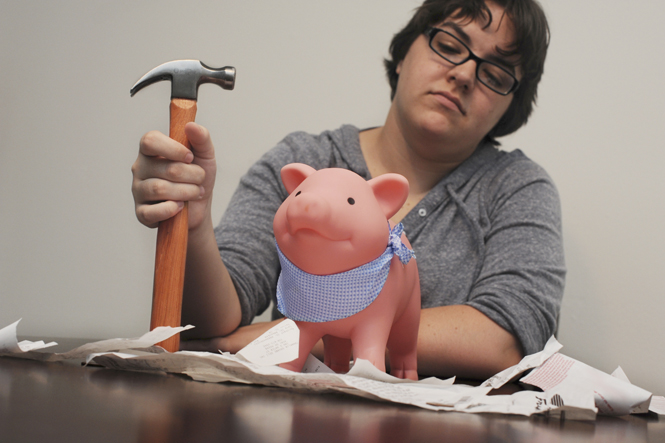Top 10 mistakes students make with their money
September 12, 2011
Tank of gas? $50. Rent payment? $80. Go out to dinner? $20.
Swipe the debit card, write a check, pay in cash, lose track of money.
Money management is rarely the first priority for college students. While almost everyone has a checking or savings account, some get carried away with the freedom.
The Daily Kent Stater has compiled a list of the most common mistakes college students make with their money. Also included are ideas to avoid making those mistakes.
John Ryan, Portage County community president for Huntington Bank, said students could avoid these financial mistakes if they take charge of their money.
“These are things they really have control over, but they need to exercise that and take control of their money and really manage it.” Ryan said.
10 common mistakes:
1. Not balancing a checkbook.
Vasana Vilavong, assistant manager at Charter One in Stow, said students lose track of their money because they do not record their spending.
“What I would recommend is keeping a checkbook register or maybe set up a savings overdraft protection,” she said. “Another thing I would recommend is to monitor your account online.”
2. Frequently using ATMs from another bank.
Economics Instructor Erik Zemljic said most banks charge students if they make withdrawals from other banks.
“If you are going to use an ATM, try to plan ahead,” he said. “If at all possible, try to withdraw from your bank’s ATM so you avoid ATM fees.”
3. Accepting the full amount of offered financial aid
Ron Stolle, assistant professor of finance, said students take out the full financial aid they are offered to spend on other things, forgetting it has to be repaid.
“If you take out too much student loan debt, under current regulations, you have to pay it back in 10 years,” he said. “It could be more than what you’re earning in take-home pay.”
4. Using check-cashing services and money orders.
Zemljic said using cashing services to cash checks results in unnecessary fees.
“A lot of students just don’t have a checking account, and when they get a check they go to a check-cashing service and they charge you fees to do that,” Zemljic said. “Then they get money orders to pay their rent, which is another fee.”
5. Not waiting for checks to clear before making purchases.
Ryan said students forget that checks do not clear right away.
“If you give someone a check, if they don’t deposit that, those funds are gone, and you don’t see that,” he said. “They need to subtract that out of their balance so that is allocated toward that so that doesn’t come back and hit them a week or two later when the person remembers to cash the check or deposit it.”
6. Not understanding checking account terms.
Zemljic said many students do not pay attention to the terms and restrictions of their accounts.
“Make sure that you ask questions and when you open it, research all these major checking accounts online,” he said.
7. Falling for an online scam.
Ryan said he sees students fall victim to online scams, including a popular magazine scam that promised proceeds to veterans in Afghanistan.
“Students just need to be cautious and curious and make sure that they double-check everything before they get involved with something,” he said.
8. Overuse of credit cards.
Stolle said students should use credit cards for small purchases to build their credit scores.
“What I recommend to freshmen is to get their parents to cosign, charge $15, $20 a month, and pay it off in total,” he said. “Build your credit score over four years, so when you graduate, you not only have a good GPA, but you also have a good credit score.”
9. Accumulating overdraft charges.
Zemljic said students get carried away and overdraft their accounts.
“They’ve racked up a couple hundred dollars worth (of charges) because they go and buy a $3 thing, a $4 thing,” he said, “it’s like $30, $35 each time, so a lot of people get in trouble with that.”
10. Losing a debit card or leaving it in the ATM
Ryan said students frequently lose their debit cards, and if they leave them at the ATM, the machine will eat the card.
“We have a lot of times when people get distracted and the machines eat the cards,” Ryan said. “Somebody comes over and says ‘hi’ to them and they forget about it, and they walk away, and the machine eats it automatically just to protect them.”
Contact Kelly Tunney at [email protected].

























